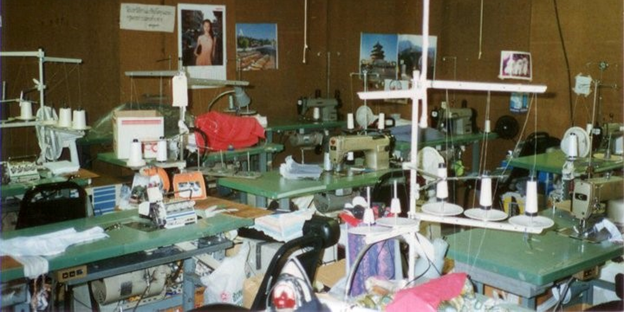
In the early morning hours of Aug. 2, 1995, federal agents raided an apartment complex in El Monte, California, where 72 Thai workers – mostly women – were found working. For as long as seven years, they had been held captive in a garment sweatshop and forced to work long hours in inhumane conditions. Surrounded by barbed wire and under the constant surveillance of armed guards, they made clothes for brand-name retailers.
The horrifying case sparked a national outcry and led to important labor reforms. I’m proud to have played a role in that process and to have built my work around protecting the rights of workers and holding those who take advantage of them accountable.
As a 26-year-old staff attorney at Asian Americans Advancing Justice-Los Angeles (formerly the Asian Pacific American Legal Center), I led a team that sued the captors and the manufacturers and retailers who benefited from the forced labor in El Monte. We were committed to ensuring that those at the top of the chain were held responsible for these horrendous violations of labor and human rights, and we were successful: we recovered over $4 million in back wages through a groundbreaking lawsuit and California passed legislation that expanded manufacturer and retailer responsibility for wage theft when they contract with sweatshops. We advocated for S visas to protect workers who report crimes so their immigration status could not be weaponized to further their exploitation. A few years later, Congress passed the Victims of Trafficking and Violence Protection Act, which built on our efforts, set up a federal interagency task force on human trafficking, and created the U and T visas for victims of crimes – such as human trafficking and forced labor – who assist law enforcement.
But the biggest changes would not be measured in dollars or policy changes. The most profound changes were personal: the workers stood up, learned they had power, and, against all odds, defied the message they had heard their whole lives – that they should keep their heads down and know their place. These are the changes that shaped me as a young lawyer and that continue to inspire me to fight for workers today.

I spent a great deal of time with the workers as they adjusted to their new lives and almost every August since then, we get together to commemorate their freedom. Over the years, they have changed jobs, started or reunited with families, some have become successful business owners or bought homes, each pursuing their own American Dream. As the daughter of Chinese immigrants who came to this country with limited English skills, I have seen from my family’s experience just how challenging it can be to start over in a new country, and that immigrant workers’ essential contributions to our economy are often undervalued. The resilience of these workers and my experiences working with them left a lasting impression, and I have continued to advocate for vulnerable and marginalized people throughout my career.
That’s why I am so honored — and excited — to join the U.S. Department of Labor as the Deputy Secretary of Labor to carry on this important work. And I’ve long been familiar with the critical role the department plays in protecting workers. The Labor Department is a member of the federal government’s human trafficking task force and its Wage and Hour Division certifies the U and T visas that are a legacy of the Thai workers’ case. The division also enforces the Fair Labor Standards Act’s minimum wage, overtime, and record-keeping provisions.
And over the past 26 years, Wage and Hour Division investigators have continued to identify sweatshop conditions in the garment industry, and in other industries with widespread wage and hour violations. Other agencies across the department, such as the Occupational Safety and Health Administration and the Bureau of International Labor Affairs, also work hard every day to make sure the conditions the Thai workers endured are not repeated.
Often, garment workers are paid a piece-rate for each item they sew or cut without regard to the minimum wage or overtime requirements. Some employers falsify time cards and underreport or fail to record actual hours worked by their employees. Though we’ve made important progress, unscrupulous employers are still taking advantage of workers, particularly workers who don’t speak English or who may be reluctant to report violations for fear of retaliation.
The anniversary of the El Monte case is both a reminder that we have a long way to go – and that change is possible. I’m proud to work alongside Secretary Marty Walsh to help lead the department responsible for making sure garment workers know their rights and that employers understand their responsibilities. We will enforce the law when we find violations and ensure every worker is protected under the law.
And, just as importantly, the Biden-Harris administration is committed to empowering immigrants and other workers to advocate for better working conditions and wages. The American Jobs Plan invests in programs that would expand pathways to good-paying jobs for immigrant workers, workers of color and all workers.
Good jobs, fair wages and strong worker protections are key to an inclusive, equitable recovery. I’m excited to get to work for all working people and help our nation build back better.
Editor’s note: You can contact the Wage and Hour Division to report violations or ask questions about labor law compliance in any language at 866-4US-WAGE (487-9243). You can read about your rights online in English, Chinese, Hmong, Korean, Punjabi, Spanish, Tagalog, Thai, Vietnamese and other languages.
Julie Su is the Deputy Secretary of Labor.

 U.S. Department of Labor Blog
U.S. Department of Labor Blog
